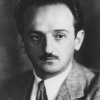John Miljan
John Miljan (Serbian: Јован Миљановић; November 9, 1892 – January 24, 1960) was an American actor of Serbian origin. He appeared in 201 films between 1924 and 1958. He was the tall, smooth-talking villain in Hollywood films for almost four decades, beginning in 1923. He made his first talking debut in 1927 in the promotional trailer for The Jazz Musician inviting audiences to see the upcoming landmark film. In later years he played imposing, authoritative parts such as high-ranking executives and military officers. He is best remembered as General Custer in Cecil B. De Mille's epic The Plainsman.











